China Arts & Entertainment
Chunwan Is Here! The CCTV Spring Festival Gala 2019 Live Blog
The CCTV New Year Gala is here! We’re live-blogging and keep you updated with the highlights and the low points.
Published
5 years agoon
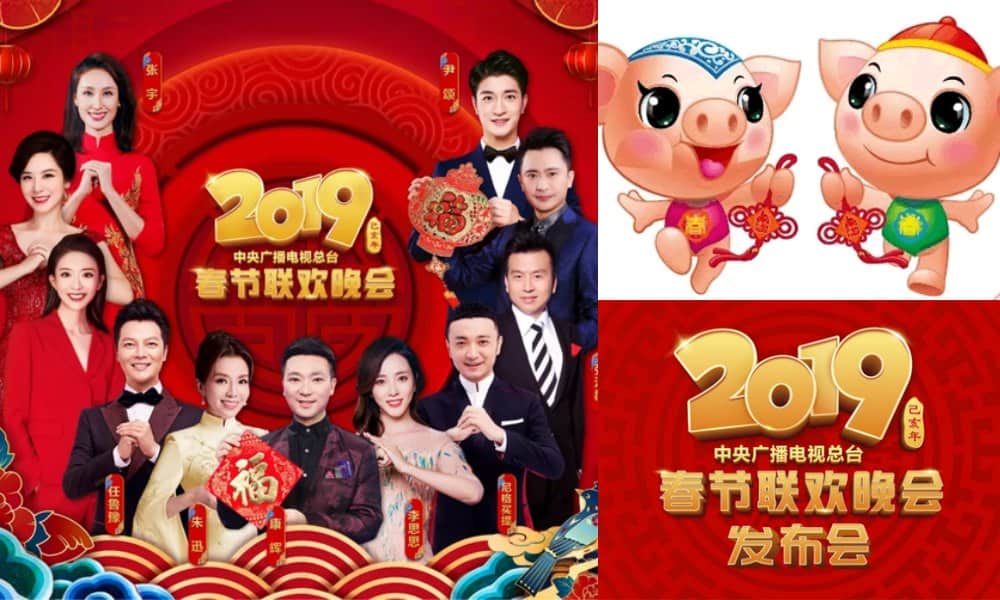
WHAT’S ON WEIBO ARCHIVE | PREMIUM CONTENT ARTICLE
First published
It is time for China’s biggest TV event of the year! Chunwan (春晚) aka the CCTV Spring Festival Gala is celebrating its 37th edition and kicks off the Year of the Pig. Watch the festival together with What’s on Weibo, as we’ll keep you updated with the ins & outs of the Gala here.
It is that time of the year again. The Chinese New Year, better known as Spring Festival, is about to start. The annual CCTV Gala celebrates the start of the festival with its 4 hours long live televised show. After live-blogging this event in 2016, in 2017, and in 2018, we’re here this year again to keep you updated throughout the show on what’s going on.
A live-streaming of the Gala is embedded in this post and will be live on Monday, February 4, 20.00 pm China Standard Time. If you have any difficulties watching, check out this YouTube link, livestream from Weibo, or watch straight from CCTV. We will be live-blogging on this page here (NOTE: this liveblog is now closed, the event is over. We’ll provide you with the entire text of the liveblog below this article!)
About the show
The CCTV New Year’s Gala (中国中央电视台春节联欢晚会 or Chunwan 春晚) is an annual live television event that is broadcasted by the national television station CCTV on New Year’s Eve. It first aired in 1983, and is watched by millions of people. In 2012, it broke the Guinness records for being the “most watched national network broadcast in the world” when it had over 500 million viewers. Last year, the show drew more than one billion viewers (Gao 2012; Jing 2019).
Despite the common criticism on the show, it is still much anticipated every year. The Gala features different acts, including singing, dancing, and comedy. It is a tradition for families to gather around the TV to watch the Gala before the New Year comes at midnight. It has also become a tradition to comment on the show and complain about it, something that is especially visible on Chinese social media, where the show inevitably becomes a trending topic every year. Criticism on the Gala is actually so commonplace that the sentence “there’ll never be a ‘worst’, just ‘worse than last year‘ (央视春晚,没有最烂,只有更烂) has become a popular saying over the years (Wang 2015, 192).
Although the Gala is a live broadcast from CCTV’s No.1 Studio, every year’s show has a taped version of the full dress rehearsal. As described by Scocca (2011), the tape runs together with the live broadcast, so that in the event of a problem or disruption, the producers can seamlessly switch to the taped version without TV audiences noticing anything.
Liveblog CCTV Gala 2019 (in order of appearance)
It is time for China’s biggest TV event of the year! Chunwan (春晚) aka the CCTV Spring Festival Gala is celebrating its 37th edition and kicks off the Year of the Pig. Watch the festival together with What’s on Weibo, as we’ll keep you updated with the ins & outs of the Gala.
(13:30) Six Hours To Go before the CCTV Gala, And Already Sparking Controversy
Just some six hours to go before the annual biggest live televised event in the world, the Chunwan, kicks off, and already the program’s timetable is sparking controversy: one of China’s biggest comical actors, Feng Gong (1957), will not participate in tonight’s event after performing there for 32 years.
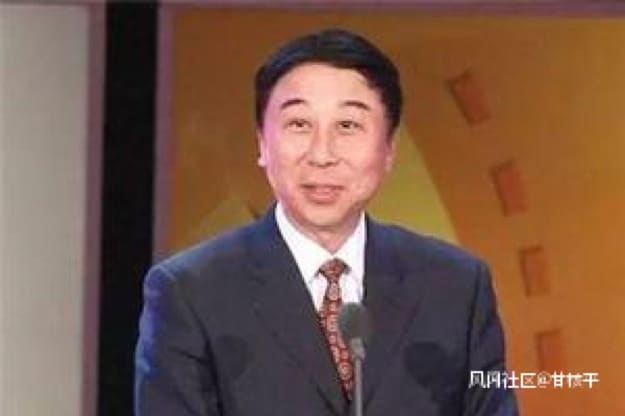
Feng Gong’s ‘xiangsheng’ crosstalk sketch apparently did not meet the requirements of the show’s strict screening, meaning his act will not come up tonight. Thousands of Chinese netizens are disgruntled, saying that Feng Gong’s appearance during the show has a certain nostalgic meaning to them. The topic has hit Weibo’s top trending lists, already hitting 130 million views earlier this afternoon. Read more about this during our live blog later today.
(19:15) The “Real” Very First Spring Festival Gala
The CCTV Gala was first aired in 1983, a year that is thus marked as the start of the Spring Festival TV Gala. But before this time, as early as 1956, Beijing Television’s also had irregular New Year’s Eve broadcasts. Trending on Chinese social media now is the hashtag “The Real First Chunwan” (#真正的第一届春晚#), with footage going viral of the 1956 edition (link) – receiving 250 million views at time of writing.
Beijing opera master Mei Lanfang participated in this event, along with other renowned names, such as Chinese novelist/dramatist Lao She and famous scientists.
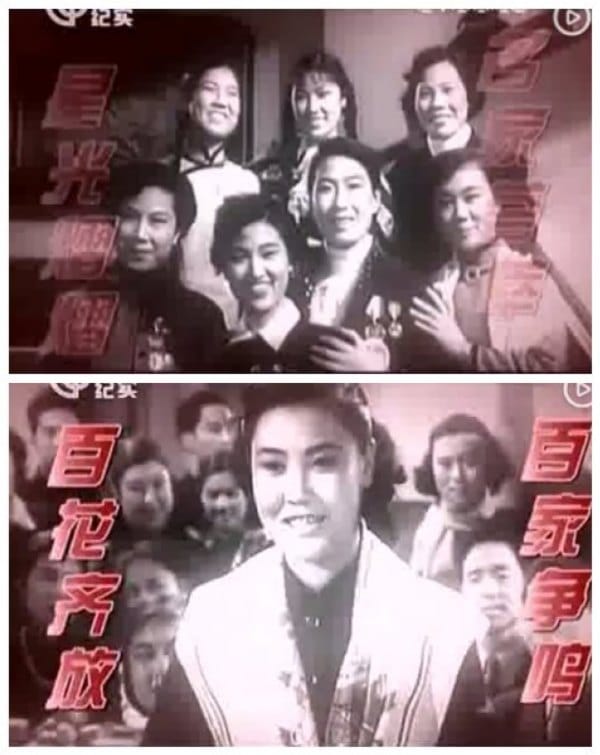
“That [Gala] was better then than it is nowadays,” many commenters write. “We’re at a historical low,” others say, suggesting that the CCTV Gala as it is now is focusing too much on popular celebrities rather than on intellectuals, artists, and scientists.
The complaining has already started, and the Gala is yet to begin!
(19:55) It’s starting! What can we expect tonight?
If you’ve previously seen the CCTV Gala, you probably know the sort of things you can expect tonight. The Spring Festival spectacle is always a mix of Chinese culture, commerce, and politics.
The show is notorious for carrying official propaganda and clearly emphasizing the themes that matter to the Party. However, no CCTV Gala is exactly the same, and there are always some noteworthy things about every annual show – in a rapidly changing China, the show always has certain changing features or styles that highlight a specific image of China and Chinese society, which can be telling for the official strategies on Chinese domestic and international affairs that lie beneath this constructed narrative & image.
Last year, for example, it was quite remarkable that although the show had many political underlying themes, such as China’s military expansion and the One Belt One Road initiative, there were no performances explicitly focusing on Chinese leaders, such as in previous years, nor were there obvious Party-focused songs such as “Without the Communist Party, There is No New China.”
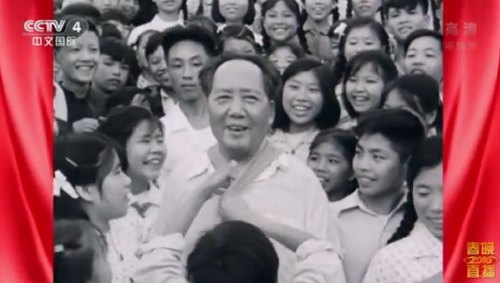
Tonight might see a similar trend as last year; the various acts and clips might not necessarily focus on the Communist Party and its leaders, but instead focus more on society, the people, ‘coming together,’ ethnic unity, and traditional Chinese culture.
There will be plenty of singing, dancing, and comical skits as well as ‘crosstalk’ sketches, some magic, opera, and acrobatics. Some 40 performances will take place over the next four hours.
There will also be a few short clips, ‘public service announcements,’ that usually focus on family values and socio-cultural unity. And we’re likely to see Jackie Chan again with a patriotic song.
(20:02) Dreamy Opening Dance
The opening act is titled “Sea of Spring’ (春海), led by, among others, Wang Qian, Song Yulong, Li Xiang, Yan Dingwen, Li Rongzhi, and Lin Qingjing. Various dance troupes are on stage, including that of the Shandong Art School and Shandong Normal University.
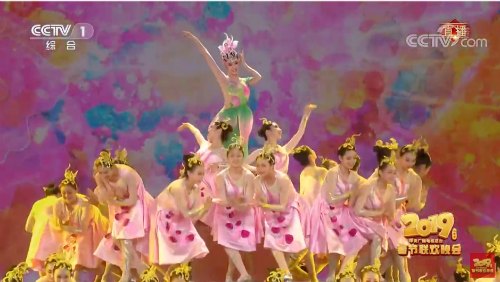
On social media, some netizens think the dance looks like a cake…
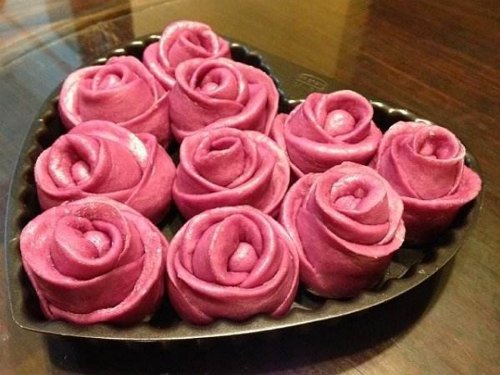
(20:06) Chunwan Social Media Buzz
The ‘Chunwan’, the CCTV New Year’s Gala, is all the talk on Chinese social media.
The hashtag “Chunwan” (春晚) has been dominating top trending lists on Weibo since Saturday, and has been a topic of discussion on Chinese social media for weeks.
“Fake schedules” of the program were leaked, hyped, and recalled. The real program was only shared by various Chinese state media one day before the start of the event, making the hashtag “CCTV Chunwan Programme” (#央视春晚节目单#) one of the biggest trending topics on Weibo right away.
For this year, the hashtags “2019 CCTV Gala” (#2019央视春晚#) and “CCTV Year of the Pig Gala” (#央视猪年春晚#) are particularly used to discuss the variety show on Weibo. Just days ago, the hashtags were already viewed millions of times, going up to 600 million views before the Gala even started.
Many netizens are anticipating to see top Weibo star ‘Angelababy,’ as well as famous actors Ge You and Cai Ming. The members of the super popular pop group TFBoys have also become a topic of discussion.

One noteworthy aspect of tonight’s Gala is its new cooperation with Baidu. Since 2015, one important feature of the CCTV Gala that links it to social media platforms is the exchange of hongbao, red envelopes with money, which is a Chinese New Year’s tradition.
Over the past few years, viewers were able to receive ‘virtual hongbao’ by shaking their smartphones – this has drawn in a lot of young viewers who’d like to get a chance to win some money. This year, instead of cooperating with Tencent’s WeChat or with Alibaba, some RMB 900 million (around $133 million) worth of hongbao is promised to be given to viewers by the Baidu Wallet app during the show. The show will have various moments where this Baidu activity will be promoted.
(20:10) The Presenters introducing themselves..
As you just saw, the presenters briefly already said hello to the audience. We’ll see them throughout the night tonight.
The top five presenters are all familiar faces. In fact, the exact same five hosts also presented the 2018 CCTV Gala. They are Kang Hui (康辉), Zhu Xun (朱迅), Ren Luyu (任鲁豫), Li Sisi (李思思), and Nëghmet Raxman(尼格买提).
The two ladies: Zhu Xun (1973) is a well-known presenter and actress from Suzhou, who is presenting the Gala for the 6th time now. Li Sisi (1986) is a Chinese television host and media personality most known for her role as host of the Gala since 2012.

The three gentlemen: Kang Hui (1972) is a Hebei-born influential CCTV news anchor who has hosted the Gala since 2015. Ren Luyu (1978) is a Chinese television host from Henan, who has also presented the Gala multiple times (2010, 2016, 2018). Nëghmet (1983) is a Chinese television host, born and raised in Ürümqi, Xinjiang, who also is not a newcomer; this will be the fifth year in a row that he hosts the gala.
The presenter who is not here on stage is Zhu Jun (朱军), one of the most well-known CCTV faces. He was involved in a ‘metoo’-like scandal in 2018 when he was accused of sexual harassment by a former intern, something which Zhu has denied. If the case goes to court, might become the first-ever civil sexual-harassment lawsuit in China, Quartz reported in January of this year.
Although probably, it is unsure if Zhu Jun’s absence tonight has to do with this case. Another familiar face, CCTV hostess Dong Qing (董卿), is also not here tonight, although she hosted the CCTV Gala since 2005.
(20:10) DRAGONS!
Ok, so now we’ve really started. Next up is a dragon dance led by male dancer Liu Jia (刘迦). The Nanjing-born dancer is 28 years old and was trained as a dancer in the People’s Liberation Army Art and Drama College.
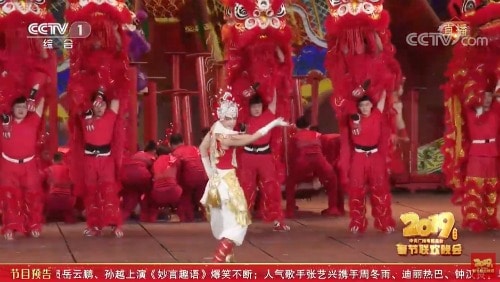
The dragon dance is a form of traditional performance that is particular to the Chinese New Year. The dragon is believed to bring good luck. Did you know that the Beijing Aquarium even holds underwater dragon dances?!
Some netizens think that the strips falling from the air look like “sausages falling from the air.” Oh, the creativity!

(20:15) Tonight’s Venues
Since 2016, the CCTV Gala has adopted a “multi-venue plan,” meaning that apart from the main Beijing CCTV no1 studio there are other ‘subvenues’ from where the show will be broadcasted. In 2018, these were locations in Guizhou, Guangdong, Shandong, and Hainan. The years prior, both in 2016 and 2017, there were also four other locations.
This year, there are three sub-venues: Jinggangshan (Jiangxi), Changchun (Jilin), and Shenzhen (Guangdong). Each venue also has its own hosts, different from the Beijing main studio presenters. Each sub-venue has two hosts, equally divided between male and female presenters.

(Noteworthy: there are two presenters with the name of ‘Yang Fan’: both in Jilin’s Changchun (female), as Shenzhen (male), something which many netizens seem to find quite funny..)
(20:18) Here comes the first crosstalk, but one VIP is missing..
Wonderful words, interesting talk” (妙言趣语 ) is the name of this comical sketch, that features Yue Yunpeng and Sun Yue (岳云鹏、孙越). Xiangsheng (相声), or ‘crosstalk,’ is a dialogue between actors with rich puns and word jokes, that usually sees two actors with one playing the “joker” and the other playing the “teaser. ”
Together with well-known Beijing-born comedian Sun Yue (1979), we see Chinese actor Yue Yunpeng (1985), who is particularly known for his xiangsheng performances.
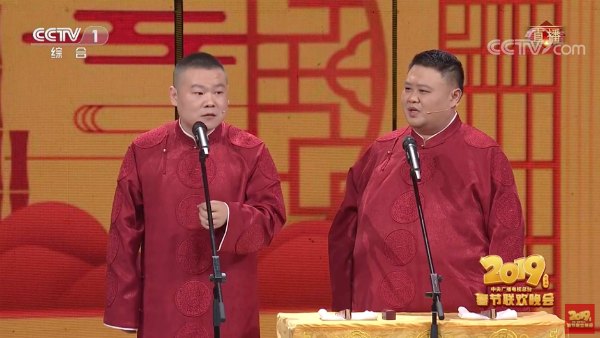
One of the topics that people on social media are discussing is the absence of Feng Gong. Feng Gong (冯巩) is one of China’s most renowned xiangsheng performers. He is best known for his performances in this CCTV New Year’s Gala and has made more appearances on the show than any other major performer. “But where is Feng Gong tonight?” is the question many netizens were asking on Sunday: “This is the first time in 32 years he’s not there, what happened?”
Today, the topic received even more attention, with the hashtag “Feng Gong Not Appearing the Chunwan” (#冯巩无缘央视春晚#) ending up in the top trending lists with 160 million views on Weibo.
Earlier today, Chinese state media reported that Feng Gong was supposed to perform with a traditional ‘xiangsheng’ act that continued last year’s theme, titled ‘I love memorizing verses 2’ (我爱记诗词2), but that it did not pass the final screening of the show because it allegedly was “not funny enough” (“笑果不足”).
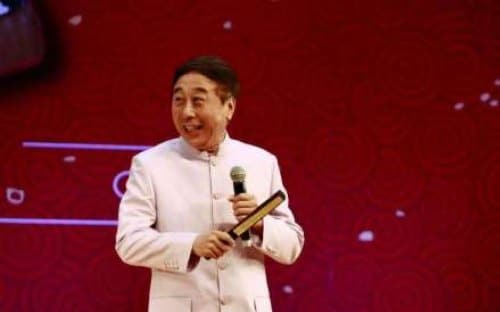
On Weibo, many netizens are disgruntled with the decision, writing: “Honestly, I didn’t think he was that funny last year, but I still want to see him – it’s not about being funny, Feng Gong means more to me than that.” Others are wishing him a happy Chinese New Year, saying: “At least he’ll be able to celebrate it at home with his family tonight.”
As for this act, some people online are joking about it, saying that left is how you look before the Chinese New Year, and right is how you look after (stuffing your face with dumplings..)
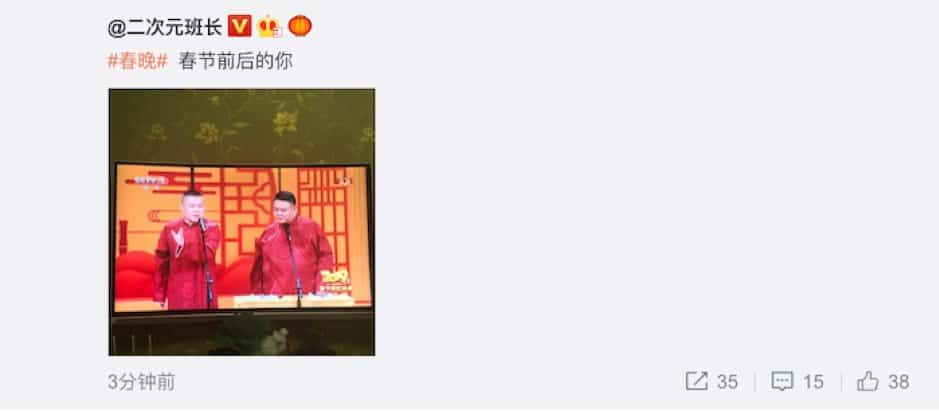
(20:26) “The single dog” and the lipstick
As first jokes on the Gala are going viral, some people think five presenters might not be the right number. Kang Hui here seems to be the “single dog caught between two couples” – something that many people experience during Chinese New Year.
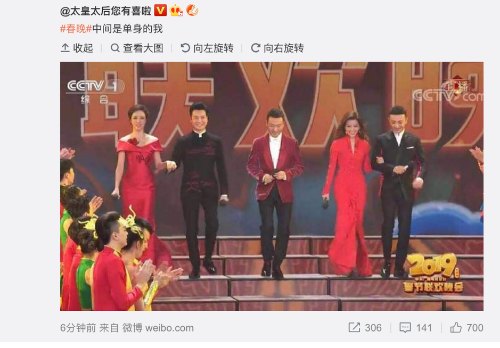
Meanwhile, other viewers are more occupied with the color of the lipstick worn by the presenters. They’ve already been identified as Yves Saint Laurent and Armani brand lipstick colors, 405 and cpb311 respectively.

(20:36) “China’s Happy Event”
This performance, titled “China’s Happy Event” (中国喜事), was joined by Chinese singer Zhang Yixing (张艺兴), popular actress Zhou Dongyu (周冬雨), Hong Kong actor Wallace Chung, Dilraba Dilmurat (迪丽热巴), and Phoenix Legend (凤凰传奇), a Chinese popular music duo consisting of female vocalist Yangwei Linghua and male rapper Zeng Yi. The duo was also part of the CCTV Gala in 2016 and in 2018.

Chinese singer Lay Zhang aka Zhang Yixing (张艺兴) debuted as a member of the South Korean-Chinese boy group Exo and he is quite popular on Weibo.
Is it the sound here, or did that sound very strange? The colors were very very bright though..
(20:38) “Youth Jumps Up”
This is one of the acts that was quite talked about before tonight. It features Chinese actor and singer Li Yifeng, together with the popular actor Zhu Yilong.
It was rumored before that the retired professional basketball player Yao Ming would also be a part of this act. (2.29 m (7 ft 6 in) tall). Don’t see him yet.
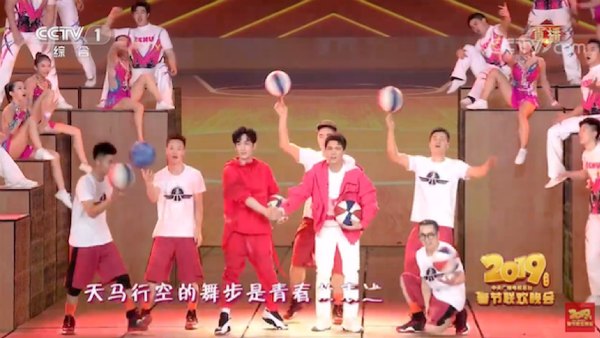
It is quite obvious that this act is lip-synced, something that is discussed annually. It is often claimed that as long as it’s the singer’s own voices that are used to lip-sync to, it is allegedly “justified.” Because the show is live and so big, singing “live” might be too much of a risk, as some performances in the past have shown. Lip-syncing, however, is also not without dangers, as some singers can really be quite off.
Various fan clubs of these artists don’t care about lip-syncing, though. Screenshots of fans going ab-so-lu-tely crazy over this performance are making their rounds on Wechat.
(20:48) “Platform”
First skit of the night!
These sketches are called ‘xiǎopǐn’小品 in Mandarin, which basically is a Chinese comedic performance in the form of a short skit between two or more performers. It is similar to xiangsheng or crosstalk. Both are often performed together in Lunar New Year galas. The main difference between the two forms is that xiaopin often involves the use of stage props and physical actions of the actors, similar to western comedic skits, while xiangsheng is closer to stand up comedy, relying primarily on speech and word jokes.
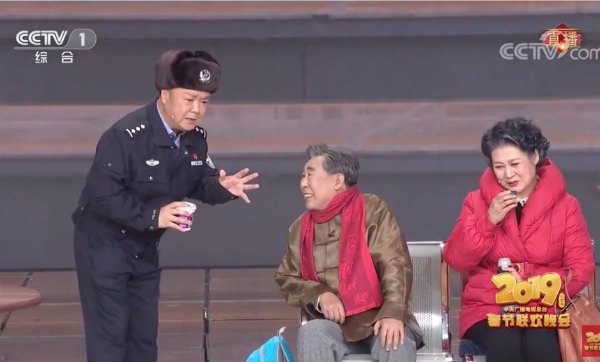
This sketch is titled “platform” and is performed by various well-known actors, who are all playing people waiting for their train. An elder couple where the man has called the wife “honey” for a long time (before he actually forgot her name), and then there’s a young man whose wife left on a train with his jacket and mobile phone. He is worried about leaving his wife with his mobile phone since he transferred 10,000 rmb to his parents before Chinese New Year, something she was not supposed to know about. When he manages to get in touch with her via the guard’s phone, it turns out she just transferred 20,000 rmb to both parents. Meanwhile, another couple is fighting about whose home to visit for the Spring Festival. This sketch clearly touches upon the issue of love issues among various generations. Of course, it all ends with a happy ending, where all couples find a solution for their problems they’re all happy with.
A special role in this sketch is the train that comes. It is the “Revival” (Fuxing) train, which first started running in 2017 and was further developed in 2018. The train is promoted for being “made in China.”
(21:04) Home, home, home, from Hong Kong to Taiwan and beyond
This year is clearly about “home,” “going home,” as stressed by the presenters. This song is titled “Mum, I’m home.” There’s a political message in the selection of singers. This song is sung by Taiwanese singer Terry Lin, the Hong Kong singer Joey Yung, and the overseas Chinese singers Sha Baoliang and Han Zi.

(21:08) Moving over to Jiangxi province
We’re in Jinggangsheng (井冈山) now, the first sub venue of the night, which is also known as the “cradle of the communist revolution” or the “holy land of China’s revolution” in the southeastern province of Jiangxi.
Two songs are performed here, along with a recital. One of the stars here is Chinese actress and singer Liu Tao, who is from Jiangxi herself. She sings together with actor Huang Xiaoming.
Jike Junyi (吉克隽逸) sings the other song. She won third place in the first season of the reality talent show The Voice of China in 2014, which is when she became instantly famous.

(21:13) Peking Opera
Time for some Traditional Opera by Yan Wei, Yuan Huiqin, and others, who perform “Beautiful Pear Garden” (锦绣梨园). This is the 9th act of tonight, of some 35+ acts in total. This is the only opera act, as far as I now know.

The Peking Opera actress Yuan Huiqin, whom we see here, previously expressed her love for Peking Opera in an interview with The Telegraph, saying: “Love and hatred, vulnerability and fearlessness, life and death: Peking Opera can communicate raw emotions with sophisticated body language that no words can match.”
Some people joking with this scene: “Don’t stand in front of people when they’re trying to make a selfie.”
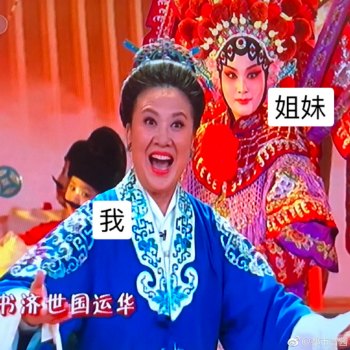
(21:17) Meanwhile, in the audience..
A guy spotted in the audience with his phone is generating some jokes on Weibo. “This is me [on my phone],” some say, while the rest of the audience is “my family.”

(21:23) “Year of the Pig”
We’ll update you soon with the sketch that’s currently airing, but didn’t want you to miss out on this image that’s going around social media currently. It’s the year of the Pig, it’s the year of Peppa, but for many people, Spring Festival is all about the food. This image shows all the different dishes you can make with pork…
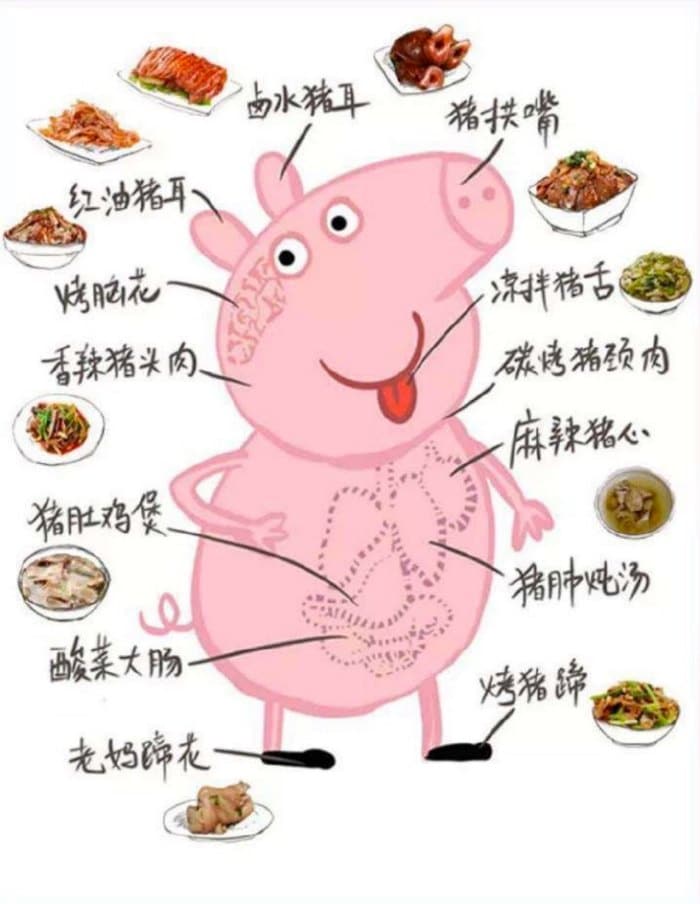
(21:26) The CCTV Gala Theme
Every year, the CCTV Gala is themed around a certain topic. This topic, obviously, is in accordance with the official state ideology and is quite telling on what specific aspects the Party would like to propagate for the upcoming year.
As said earlier in this liveblog; although the CCTV Gala is also a commercial event (the station is state-owned but also profit-seeking in a highly competitive media environment), it is also still highly political, and carries official propaganda along with consolidating political centralism.
The central theme of 2018, for example, was “Chinese values, Chinese power.” Other previous themes are “National Unity” or “Chinese Dream.”
This year, the Gala is themed around the idea of “New China.” The full theme, as described by CCTV, is: “Advancing the New Era, Celebrating a Happy Year” (奋进新时代、欢度幸福年).
The past two years, the Gala has been directed by Yang Dongsheng. This year, Liu Zhen (刘真), Deputy Director of CCTV arts channel, is in charge of the program. He is known for previously directing the 2009 anniversary night of the Great Sichuan earthquake.
(21:31) Office Time
This office skit is performed by Chinese actresses Yan Ni and Ya Hailong, together with actor Zhou Yiwei.
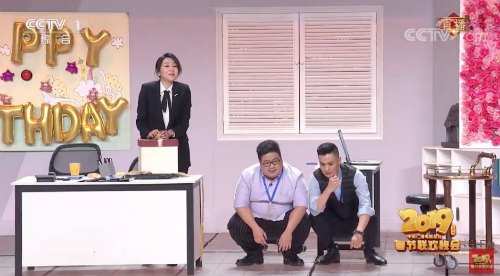
The skit evolves around a rehearsed marriage proposal going wrong, with one worker accidentally proposing to the company director. The boss walked in when they were practicing, and misunderstood the gifts and cakes they prepared, thinking they were for her instead. Later on in the act, the secret is revealed, but the boss responds surprisingly ok when the office worker revealed he was always working overtime, having no time for these personal matters. Work pressure is a recurring theme on social media too, a theme incorporated in this sketch.
(21:42) Dance/song “The Distance of Time” (with flying drones)
Two ‘kings’ of Mandopop, Sun Nan and Zhang Jie (also known as Jason Zhang) perform on stage here.
Sun Nan has performed at the CCTV Gala several times before. His 2016 performance with 540 robots, all dancing simultaneously, was quite spectacular.

They are accompanied by the Zhongnan Minzu University Music Dance Troupe, and you can see drones flying all around them.
(21:46) “The Spirit of Shaolin”
The first martial arts performance of the night, really quite spectacular, performed by members of the Shaolin Tagou Martial Arts School from Henan.
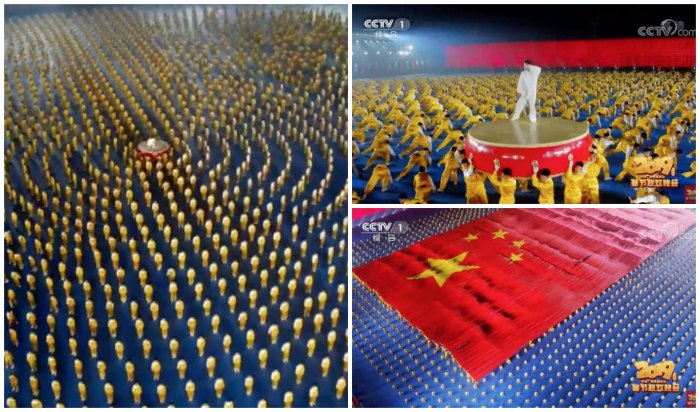
This is also the first big Chinese flag we spotted tonight, and it’s HUGE!!!
(21:54) “‘Son’ is here” sketch with Cai Ming
The third sketch of the night features an all-star cast with actors Ge You, Cai Ming, and Pan Changjiang.
Cai Ming (1961) is known for performing sketch comedy in CCTV New Year’s Gala since 1991. She is known for her sharp language. Cai is quite active on Weibo. Earlier this week, she posted a ‘selfie’ of her and Dilraba Dilmurat, the singer of Uyghur heritage who appeared in the show earlier tonight.

Pan Changjiang (潘长江, 1957) is a famous skit actor who has regularly appeared in the Gala since his younger years. His colleague Ge You (also 1957) is one of the most recognizable acting personalities in China. He plays a man who is selling “health products,” conning older people out of their money.
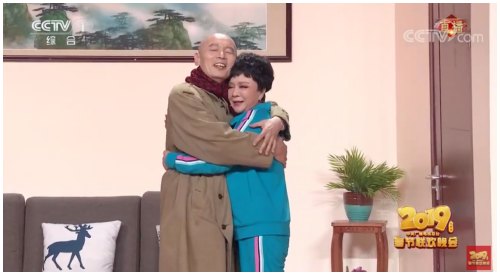
(22:04) “Me Watching the Gala vs Me Watching Weibo”
This post is making its rounds on Weibo now, saying “Me watching the CCTV Gala versus me watching Weibo.”
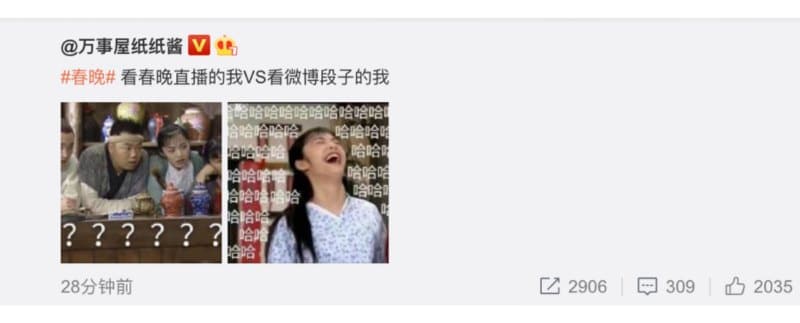
It really seems that the Gala has turned into a social media craze, where people are more interested in the jokes going around Wechat and Weibo than the actual event itself. This also means that the Gala is becoming more popular among young people, who are creating their own traditions from the classic ‘Spring Festival ritual’ of gathering around the TV with the family to watch the Gala together.
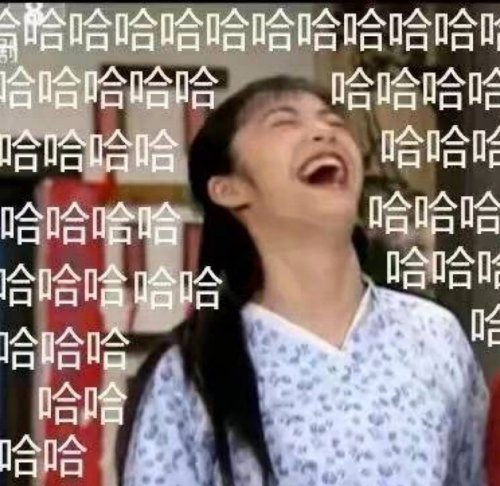
(22:07) About that Shaolin Act…
It was the most spectacular act of the night thus far. But were those real people or were they Minions? This is the joke that’s going viral now.
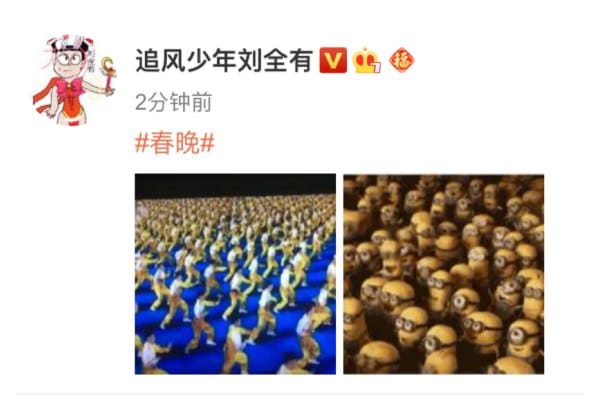
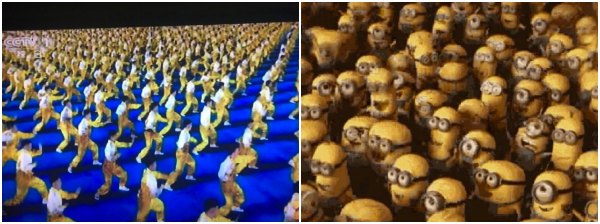
(22:09) TFBoys here!
This is one of the most anticipated acts of the night, since it is performed by members of the hugely popular TFBOYS. This act is titled “We’re All Pursuing Dreams” (我们都是追梦人), and is likely hinting at the “Chinese Dream.”
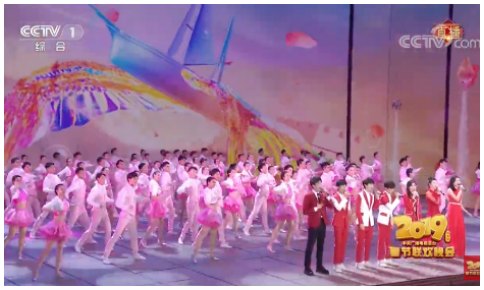
This is the fourth time that members of TFBoys are making their appearance at the show since their first performance at the 2016 CCTV Gala.
(22:13) A bit of magic
Taiwanese magician Lu ‘Louis’ Liu (刘谦, 1976) is at the center of this magic act. He is known as the only Taiwanese magician to perform in Hollywood’s ‘Magic Castle,’ and is commonly referred to as ‘Taiwan’s most renowned magician.’ He previously performed at the CCTV Gala in 2009.
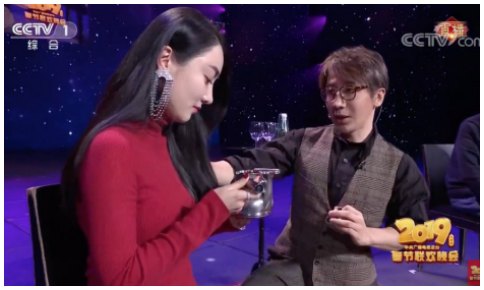
(22:25) “Seizing a seat”
This sketch is called “Seizing a seat,” and I’d actually expected it to be hinting at two separate incidents on Chinese high-speed trains in 2018 that became huge trending topics. In late August of 2018, one rude man from Shandong who refused to give up the seat he took from another passenger became known as the “High-Speed Train Tyrant” (高铁霸座男 gāotiě bà zuò nán) on Chinese social media. Later, a woman from Hunan was dubbed ‘High-Speed Train Tyrant Woman’ (高铁霸座女 gāotiě bà zuò nǚ”) by Weibo netizens, when a video of her bizarre behavior also became trending; she had taken a seat assigned to another passenger while riding the train from Yongzhou to Shenzhen and refused to give it up.
But this particular sketch now seems to be focused on “seizing a seat” in a classroom instead, with parents during a parent’s meeting fighting over who gets the best seat at the school. The story focuses on parents who are not involved in their kid’s education, leaving the responsibility to the school, with the moral behind the story allegedly being that parents should be more involved in their child’s education.
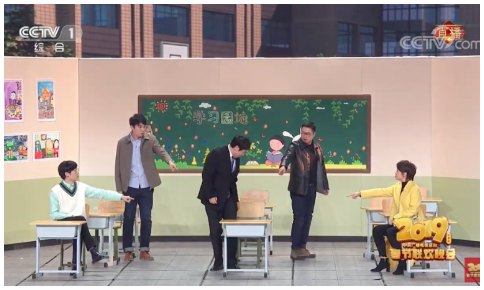
“This is my life,” some online commenters are saying, posting the meme below (the speed in which Gala-related memes are spreading on Weibo and Wechat is incredible!).
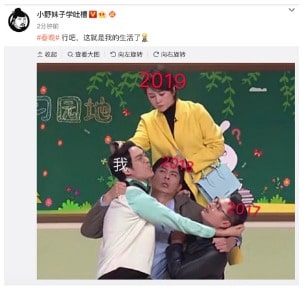
(22:35) The sellers who are making money through the Gala
Throughout the Gala, there are smart people who are tracing down the clothes and shoes worn by the performers, which are also for sale.
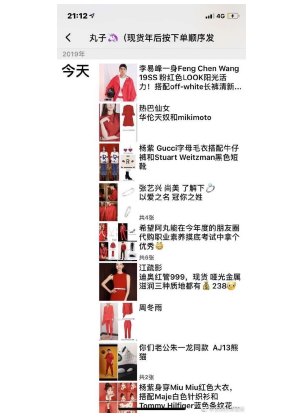
(22:41) All over the place!
After a brief public announcement, we’re now watching the dance “Looking for Friends.” This dance is performed by the ‘Air Force Blue Sky’ children’s dance troupe (空军蓝天幼儿艺术团) and it is all over the place!
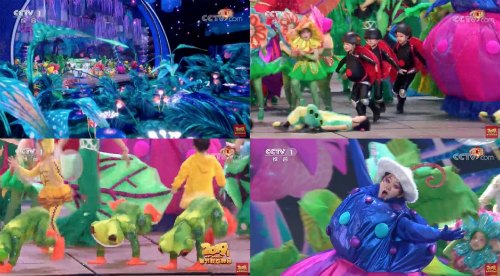
(22:43) Sleepless night
The song “No Sleep Tonight” (费玉清) is brought by Fei Yu-ching. This Taiwanese singer recently became a topic on Chinese social media with a video featuring his cool dance moves during his younger years. After 46 years in showbiz, his Farewell Tour is taking place this year.
He is joined on stage by Kelly Chen, a Hong Kong Cantopop singer and actress. She is also known as the “diva of Asia.”

Some good Monday vibes: Taiwanese singer Fei Yuching in his younger years with some oldskool moves. Really loving this! After 46 years in showbiz, his Farewell Tour is taking place this year #费玉清 pic.twitter.com/aWW0TPazDd
— Manya Koetse (@manyapan) 28 januari 2019
(22:46) The Baidu sponsor
Now it is time for the aforementioned Baidu activity. At this year’s event, China’s search giant Baidu, has the exclusive right to interact with the huge audience of the CCTV Gala via red packets interactive activity. The audience can get red packets through shaking, searching and watching video clips on Baidu app.
(22:49) Xiaopin “Show you the drill”
On stage, we see the award-winning (stage) actor Lin Yongjian, together with Sun Tao and Ju Hao, a well-known comedian.

Usually, the sketches performed during the Gala can be quite controversial. Sometimes for the way they depict women, last year specifically for the Africa blackface skit. It seems that this year, the sketches are quite safe and aren’t triggering any controversy, yet. But the night is still young!
(22:57) Air Jordan Craze
Many of the clothes and shoes and other items featured in today’s Gala are becoming hot selling items. Right now, people are going crazy over the Air Jordans that were worn in one of the acts earlier tonight.



(23:04) Moving over to Changchun
Moving over to the second sub-venue of the night now, where we see Aska Yang (Yang Zongwei) singing on stage. Aska Yang had his debut in Taiwan as a contestant on season one of Taiwanese TV singing contest One Million Star.
He is joined by Angela Yeung Wing, better known by her stage name Angelababy, a Chinese model, actress, and singer based in Hong Kong, who is one of the Weibo stars with the most followers.
The second Changchun act is performed by Chinese actors Liu Ye and ‘Johnny Bai.’
Fireworks! Drones! And one of the cars turning into a ‘Transformer’! So far, the sub-venues offer some of the most spectacular performances of the night.
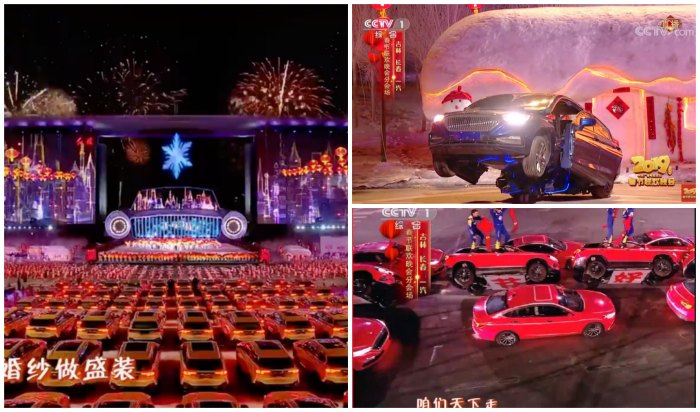
The focus on cars here relates to Changchun as one of China’s ‘car cities’ as it is home to the brand that produced the first national auto brand (长春一汽), last year was the 65th anniversary of the factory’s founding.
(23:09) National Ballet of China
This is yet another dance, there are supposed to be four big dancing acts tonight. The dance is titled the “Dunhuang Flying Asparas” (敦煌飞天), and is performed by the National Ballet of China, also known as the Central Ballet Troupe, which employs over 70 dancers.

(23:13) The Legends are Here! “My Motherland and I”
This song, titled “My Motherland And I” (我和我的祖国), is one of the acts that has received quite some attention in Chinese media prior to the Gala because of the very special reunion between some of China’s older legendary musical artists.
This special reunion also shows that this year, the Gala wants to pay extra attention to China’s elderly, something that contrasts with last year’s Gala, that was very much focused on young people and new talent.
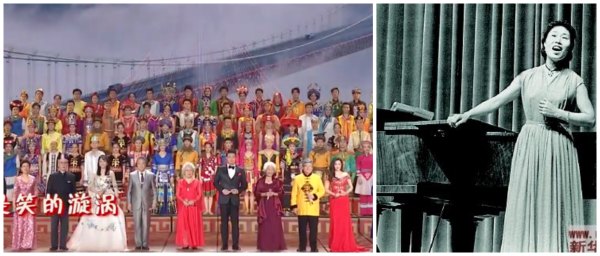
One of the performers here on stage is Guo Shuzhen, who is 92 years old and is a famous “legend” within China’s music education.
All artists here are very famous ‘legends’; Li Guangxi (1929), Hu Songhua (1931), Liu Bingyi (1935), Yu Shuzhen (1936), De Dema (1947).
Also on stage is Yang Hongji (杨洪基, 1941), a Chinese national-level actor and one of China’s most outstanding baritones.
And there’s Guan Mucun (关牧村,1953), a female Chinese mezzo-soprano singer from Henan province who is known for developing her own musical style by blending Western and traditional Chinese melodies.
They all perform together with Chinese artists of the younger generations.
(23:25) Xiaopin “Don’t Know Whether to Laugh or Cry”
Chinese xiangsheng performer, actress and comedian Jia Ling (1982) stars in this comical skit together with Zhang Xiaofei and Xu Juncong.
The story features a young man who ordered a cleaning lady to clean his apartment, but the woman (in red) has an injured shoulder so she can’t really do it. She ordered another service to do the cleaning for her (in yellow) instead. That young woman then thinks the lady in red is actually the wife in the house who refuses to clean the house – all the confusion between the people is creating a chaotic and comical situation.
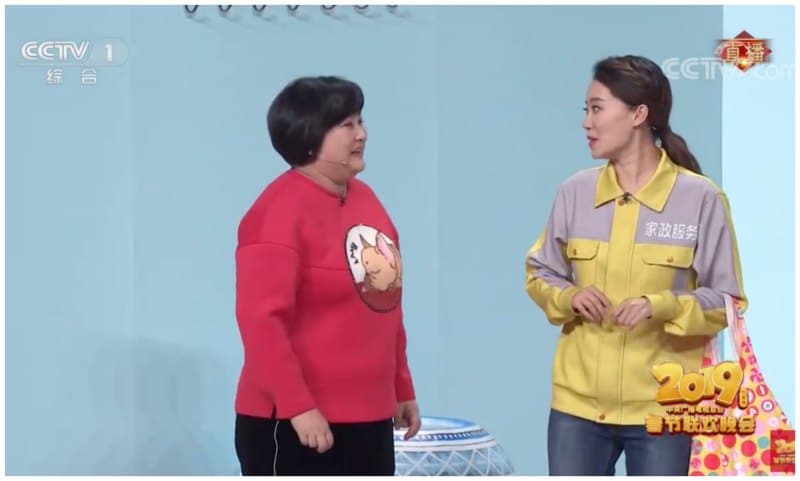
(23:39) Here comes Jackie Chan!
Jackie Chan (成龙) has become an annually returning performer at the CCTV Gala. Although his performances are always much-anticipated, they’ve also been pretty cringe-worthy. In 2017, the song performed by Jackie that was simply titled “Nation” was met with criticism for being overly political. Last year, the Hong Kong martial artist sung a song that was called “China.”
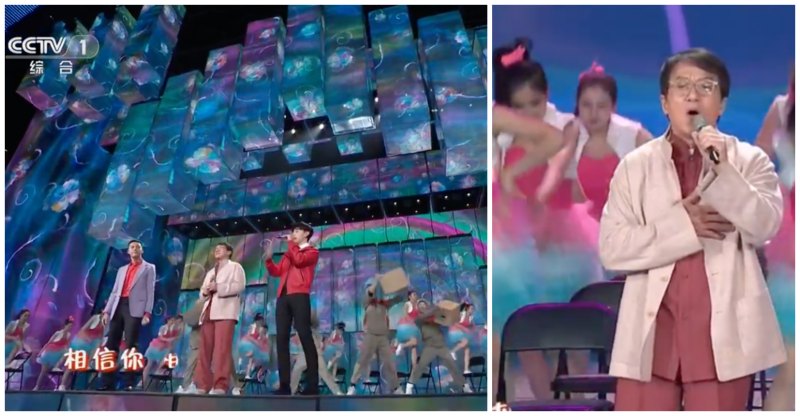
This year, the title of the song is a bit deeper than in previous years: it is titled ‘My Struggle, My Happiness’ (我奋斗我幸福), and is sung together with Hong Kong singer and actor William Chan and with Deng Lun.
Deng Lun (邓伦) (1992) is a Chinese actor who gained widespread popularity with the family drama “Because of You”, an adaptation from the 2014 Korean drama “Jang Bo-ri is Here.”
Also on stage are performers from Bapaweilai, a children’s art education group based in Hong Kong.
(23:44) Meanwhile backstage…
While “Together towards Happy China” is being performed on stage by Zhang Ye and Lu Jihong, famous Chinese actor Ge You is all the talk on Weibo for a photo that has popped up of him backstage, showing the actor tired on the couch.
A famous meme in China also shows the actor in a similar position.
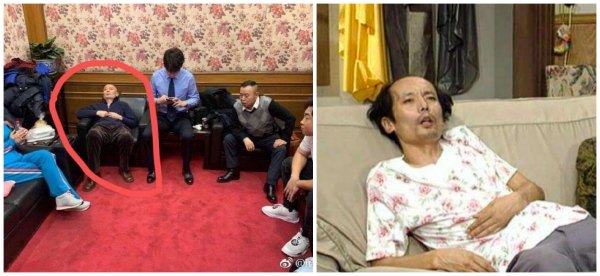
(23:45) “Hero Flight Sichuan Flight 3U8633”
As every year, this is the part of the show where some ‘exemplary persons’ get honored for their accomplishments. Noteworthy is that the crew of Sichuan Airlines is honored tonight.
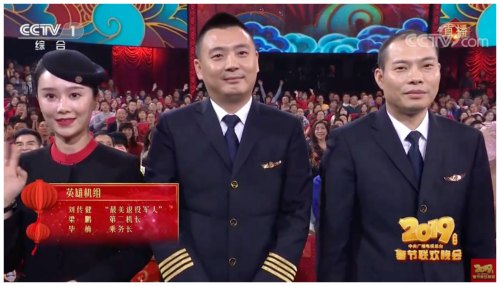
In May of 2018, pilot Liu Chuanjian on Sichuan Airlines 3U8633 made an emergency landing in southwest China after a broken cockpit window sucked his co-pilot halfway out of the aircraft. He braved the intense cold and blasting wind to land the plane in about 20 minutes, and in doing so, rescuing all 128 people aboard the Airbus A319.
(23:48) “Thumbs up for the New Era”
This song really resonates with the Gala’s “New China” theme. The singer is Wulan Tuya (乌兰图雅), who is also known as the “Flower of Mongolia.” She was born and raised in Inner Mongolia, and now combines elements of Mongolian traditional music with electronic beats in her music.
This is one of the spectacular performances of the night, that is joined by a number of artists who were selected through a special CCTV Gala contest.

The other performers come from various performance groups from Beijing, Shandong. Harbin, Sichuan, etc.
(23:50) Last sub-venue of the night: Shenzhen
The last sub-venue of the night is Shenzhen, which is often also called China’s “Silicon Valley” or the “tech capital of China.” This venue features two different acts, both songs, titled “Let youth Be Free” and “Friends.”
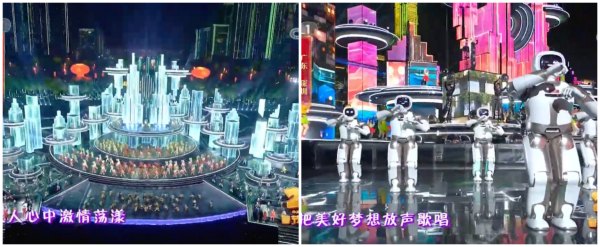
(23:58) Some old-school propaganda
“Together With my Homeland,” sung by Lei Jia and Han Lei, is the last song before the 0.00 countdown moment.
Lei Jia is a Chinese folk soprano and ‘national class one performer.’ Han Lei is a singer-songwriter of Mongol descent who is also known as Senbor. He rose to prominence in 1997 on the CCTV New Year’s Gala. The screen behind the artists shows some old-school flag raising and China’s urban skylines.

(0:00) Time for the Countdown!!!

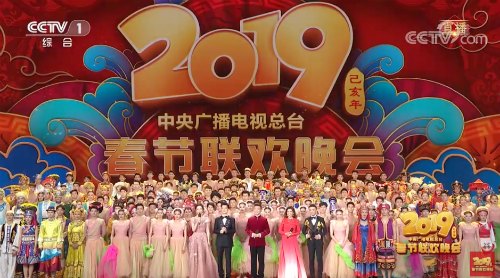
(0:05) Building Together on the Chinese Dream
Fireworks everywhere, firecrackers everywhere. Time to sing about building on the Chinese Dream together, a theme that has been consistently featured in the Gala over the past years. Singers: Cao Fujia, Xian Zi, A Yunga, Ju Laiti, and ‘Xingguang Dadao’ talent show winner Ang Sa.


(0:14) Acrobatics
We’re reaching the final acts of the night. This performance shows acrobatics by various renowned acrobatic groups from Henan, Guangxi, Dalian, and other places.

Thus far noticeable tonight: the skits have been very ‘safe’ and there has been no *excessive* display of straightforward political (Party) themes compared to other shows in earlier years; the images of Mao, Deng, Xi, and others that would usually make their way into the show have not been there (or I haven’t noticed them). Although there’s usually a very clear focus on unity in bringing together various ethnic groups, that has not popped up in this show as much as it has in the past. Instead, there has been more focus on ‘old’ and ‘young’ uniting, with “China’s New Era” being the clear theme of the night.
The acrobatic performance is followed by a special segment that shows water ballet. The act is titled “Burst into Bloom” (绽放).
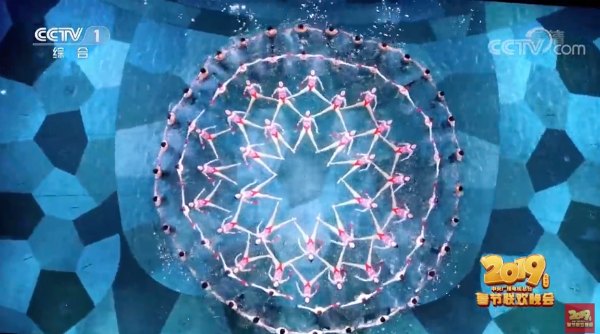
(0:19) “Love Substitute Driver”
‘Daijia’ is a service that is provided by various companies in China, where one can hire a substitute driver to drive them home in their own vehicles. This is what this last skit of the night focuses on.
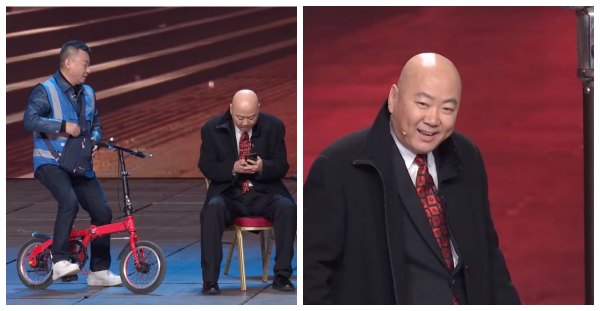
The service is encouraged because it decreases the risk of people drunk driving. The driver will usually arrive by bike, then drives the person home in their own car, with the bike in the back, and then cycles on to the next customer from there -quite convenient and safe (for the people who’ve been drinking and can no longer drive)!
In this sketch, with Guo Donglin and Shao Fenghe, the drunk man actually has no money and just called the driver because he is lonely, lovesick, and needs some companionship. The moral of the story? No matter how low you are, you can always get back up.
(0:38) “Outstanding Beauty”
After the song “The Brightest Star in the Sky,” we’ve now arrived at the final of the night, featuring the dance performance “Outstanding Beauty” with lead dancers Li Yanran, Wang Jiaxin, and Hu Tulan.

A noteworthy moment before this segment is that the presenters of the night asked the viewers when they’d get married and have a (second) baby…(啥时候结婚啊?啥时候要二胎啊). Perhaps it’s mocking the pressure many young people at home are facing.

Unforgettable Night!
The last song of this night is “Unforgettable Night” (难忘今宵). It is sung by the 74-year-old singer and dancer Li Guyi (李谷一), who became famous with the song ‘Homeland Love’ (乡恋) around the time of China’s Reform and Opening Up – the singer and her songs are nostalgic for many viewers.
Li Guyi also appeared at the very first version of the Gala in 1983, and became the singer that sang the most at the event.

Li Guyi sings the same song every year at the end of this show. The last song ends with all performers of the Beijing venue on stage. The song repeats the phrases 共祝愿 祖国好: let’s all wish together that the country will be good, that is will last long and be prosperous. The hosts wish everyone a happy new year. It’s a wrap!
Thank you all for watching the CCTV Gala with us and happy new year to you.
– By Manya Koetse & Miranda Barnes
References
Gao, Yuan. 2012. “Constructing National Idenitiy through Media Ritual: A Case Study of the CCTv spring Festival Gala.” Master’s Thesis, Media and Communication Studies, Uppsala University.
Jing, Meng. 2019. “Baidu seeks to play catch up in mobile app race with bet on world’s most-watched TV show.” South China Morning Post, 18 January https://www.scmp.com/tech/big-tech/article/2182616/baidu-seeks-play-catch-mobile-app-race-bet-worlds-most-watched-tv-show [2.2.19].
Scocca, Tom. 2011. Beijing Welcomes You: Unveiling the Capital City of the Future. New York: Riverhead Books.
Wang Ge. 2015. “Popular Spring Festival Gala language: Sociocultural Observations.” In Linda Tsung and Wei Wang, Contemporary Chinese Discourse and Social Practice in China, 185-200. Amsterdam/Philadelpia: John Benjamins Publishing Company.
If you enjoy What’s on Weibo and support the way we report the latest trends in China, we would appreciate your donation. It does not need to be much; we can use every penny to help pay for the upkeep, maintenance, and betterment of this site. See this page for more information.
Spotted a mistake or want to add something? Please let us know through email.
©2019 Whatsonweibo. All rights reserved. Do not reproduce our content without permission – you can contact us at info@whatsonweibo.com
Manya Koetse is the founder and editor-in-chief of whatsonweibo.com. She is a writer, public speaker, and researcher (Sinologist, MPhil) on social trends, digital developments, and new media in an ever-changing China, with a focus on Chinese society, pop culture, and gender issues. She shares her love for hotpot on hotpotambassador.com. Contact at manya@whatsonweibo.com, or follow on Twitter.

China Arts & Entertainment
Singing Competition or Patriotic Fight? Hunan TV’s ‘Singer 2024’ Stirs Nationalistic Sentiments
“I’m in Zibo eating barbecue, I really don’t feel like listening to Alicia Keys.” Hunan TV’s ‘Singer 2024’ has set off a new wave of national pride in China’s music and performers.
Published
2 months agoon
May 17, 2024By
Ruixin Zhang
Besides memes and jokes, Hunan TV’s ‘Singer 2024’ has set off a new wave of national pride in China’s music and performers on Chinese social media.
In May, while the whole of Europe was gripped by the Eurovision Song Contest frenzy, Chinese audiences were eagerly anticipating the return of their own beloved singing competition, Singer 2024 (@湖南卫视歌手), formerly known as I Am a Singer (我是歌手).
The show, introduced from South Korea’s MBC Television and popular in China since 2013, only features professional singers who have already made a name for themselves.
Rather than watching unknown aspiring singers who are hoping to be discovered in many singing competitions, such as Sing! China, Singer 2024 gives audiences a show filled with professional and often stunning show performances by established names in the entertainment industry.
Since 2013, renowned singers from China and abroad have appeared on the show, including Chinese vocalist Tan Jing (谭晶), British pop singer Jessie J, and the late Hong Kong pop diva Coco Lee. However, no season managed to create as many waves as the 2024 season did, dominating all social media trending topics overnight.
So, what exactly happened?
COMPETING WITH FOREIGNERS
“The difference between the Grammys and the Strawberry Musical Festival”
In early May, the pre-show promotion of Singer 2024 was already buzzing on Chinese social media after a list of featured singers appeared on Weibo, including big names such as American singer-songwriter Bruno Mars, Korean-New Zealand singer Rosé from Blackpink, and Japanese diva LiSA.
Although Singer previously had many foreign singers on the show, this international celebrity lineup still caused a stir.
On the day of the first episode, only two foreign singers were announced to appear on the show: young Moroccan-Canadian singer Faouzia and the Grammy-nominated American singer-songwriter Chanté Moore. The other contestants were all Chinese singers who are already well-known among Chinese audiences. Because many people were unfamiliar with the two foreign singers, they joked that the winner of this season was already set in stone; surely it would be the famous Chinese singer Na Ying (那英), known for her beautiful voice.
However, that first episode surprised everyone as the two foreign singers, Faouzia and Chanté Moore, showed outstanding vocal skills. This not only startled many viewers but also made the Chinese contestants uneasy. Several experienced Chinese singers apparently were so unnerved after watching Faouzia and Chanté Moore’s performance that their voices trembled when singing.

Since the show was broadcast live – without post-production editing or autotune – audiences got to hear the actual vocal capabilities and see performers’ genuine reactions. It seemed undeniable that the foreign contestants did much better in terms of vocals and stage presence than the Chinese ones. Some online commenters even said that the gap between Chinese and foreign singers’ levels was like “the difference between the Grammys and the Strawberry Musical Festival” [a local Chinese music festival].
Chinese online influencer Yongkai (@陈咏开165) shared screenshots of Chanté Moore’s backstage reactions during the show. The American celebrity seemed puzzled when hearing the somewhat underwhelming performance by Chinese singer Yang Chenglin (楊丞琳), and she appeared much more positive when Na Ying sang.

This noteworthy scene, coupled with Chanté’s comments during an interview saying that she thought the Chinese production team had invited her on the show to be a judge, turned the entire show into a display of foreign singers outshining the Chinese contestants.
By the end of the first episode, Chanté Moore and Faouzia unsurprisingly ranked first and second, with Na Ying in third place.

After the show, some online commenters jokingly pointed out that Na Ying, being of Manchu descent like the rulers of China during the Qing Dynasty, showed some similarities to Empress Dowager Cixi’s defiance against Western colonizers in the way she “single-handedly took up against on foreigners” on the show.
They humorously turned Na Ying’s expressions into memes resembling Empress Dowager Cixi from an old Chinese TV show, with captions like “I want the foreigners dead” (“我要洋人死”).

Others suggested finding better Chinese singers for the show who could compete with Faouzia and Moore.
“SINGING WELL” CULTURALLY COLONIZED?
“I’m in Zibo eating BBQ, I really don’t want to listen to Alicia Keys.”
Initially, discussions about the show were light-hearted and humorous, until some netizens who couldn’t appreciate the jokes began to dampen the mood and made online discussions more serious.
Zou Xiaoying (@邹小樱), a music critic with nearly two million followers, posted on social media after the show, stating that he would have never voted for Chanté Moore or Faouzia. Not only did Zou question their vocal talent, he also wondered if the aesthetic of Chinese listeners had been influenced by Western music taste to such an extent that it has been “culturally colonized” (“文化殖民”). Meanwhile, he praised the members of Beijing rock band Second Hand Rose as “national heroes” (“民族英雄”).
He wrote:
If I had three votes for the first episode of “Singer 2024,” I’d vote for Second Hand Rose, Na Ying, and Silence Wang [note: Chinese singer-songwriter and record producer Wang Sushuang 汪苏泷]. The reason I wouldn’t vote for Chanté Moore or Faouzia is because — do they actually sing so well?
Has our definition of “singing well” perhaps been colonized? Just as our modern-day use of Chinese has little to do with our classical Chinese poems, with the foundation of modern Chinese actually being translations from the 20th century, is this also a form of ‘cultural colonization’?
You must think I’m talking nonsense again. But when I listen to Chanté Moore singing “If I Ain’t Got You,” I find it too boring. I know her singing is “good,” but this “good” has nothing to do with me. If, for Chinese listeners, Chanté Moore’s “good” is the standard, then is that what we in the music industry should be working towards? Isn’t that funny? When you open QQ Music or NetEase Cloud Music, and it recommends these songs to you every day, won’t you be convinced to practice again?
Of course, I know Chanté Moore is in good shape, very relaxed. Actually all of the Chinese singers tonight were very nervous. Yang Chenglin (杨丞琳) was nervous, Na Ying was also nervous. Even a seemingly carefree band like Second Hand Rose, if you listened to the introduction of their song, [you’ll find] they were so nervous that Yao Lan, supposedly “China’s No.1 Guitarist”, was so nervous that he hit the wrong note. It was not even a fast-paced solo (…), how nervous could he be? When everyone’s so tense, the confidence of Chanté Moore and Faouzia is indeed something that East Asia can’t match. In East-Asian [entertainment] circles, represented by China/Japan/Korea, our different cultural habits, upbringing, and ethnic characteristics have made it so that we don’t possess these kinds of singing abilities, even including our ways of emotional expression. I don’t know from which season it started with ‘Singer’ – and if it’s some kind of Catfish Effect (鲶鱼效应 ) – that they brought international singers with different cultural backgrounds into the competition. But this isn’t the Olympics, it’s not like Liu Xiang [刘翔, Chinese gold medal hurdler] is going to defeat opponents from the United States or Cuba. “I’m in Zibo eating barbecue, I really don’t feel like Alicia Keys.” (This line is not mine, I stole it from my WeChat friend).
Because of this, I find Second Hand Rose even more rare and precious. It’s just like I used to love asking: If you could only recommend one Chinese band to your foreign friends, which one would you recommend? Some say it’s New Pants (新裤子), some say it’s Omnipotent Youth Society, but my answer will always be Second Hand Rose. ‘The drama of Monkey King is a national treasure,’ its light will always shine. Facing the gunfire of Western powers, Second Hand Rose is standing on the frontline, they are our national heroes. Indeed, the band itself was nervous, (..), but when Chanté Moore goes off like a singing dolphin, we are fortunate to have Second Hand Rose at the frontline; the Chinese sons and daughters are building the Great Wall of Music of flesh and blood.
Because of this, I find Second Hand Rose even more rare and precious. It’s just like I used to love asking: If you could only recommend one Chinese band to your foreign friends, which one would you recommend? Some say it’s New Pants (新裤子), some say it’s Omnipotent Youth Society, but my answer will always be Second Hand Rose. ‘The drama of Monkey King is a national treasure,’ its light will always shine. Facing the gunfire of Western powers, Second Hand Rose is standing on the frontline, they are our national heroes. Indeed, the band itself was nervous, (..), but when Chanté Moore goes off like a singing dolphin, we are fortunate to have Second Hand Rose at the frontline; the Chinese sons and daughters are building the Great Wall of Music of flesh and blood.
Anyway, no matter if they’re strong or not, I would never vote for the foreigner.
The comment about ‘I’m in Zibo eating barbecue, I really don’t feel like [listening to] Alicia Keys’ refers to the craze surrounding China’s ‘BBQ town’ Zibo. In Zibo, Chinese visitors like to sing, drink beer, and enjoy food together; it’s a simple and modest way of appreciating life and music, which contrasts with slick and smooth American or foreign styles of performing and singing.
Whether Zou’s criticism was for attention or genuine sentiment, it shifted the focus of the discussion from music to patriotism.
CHINESE SINGERS WITH MILITARISTIC UNDERTONES
“I volunteer to join the battle”
Amidst all this, some netizens, easily swayed by nationalist sentiments, began to seek help from the “national team” (国家队) of singers — musicians employed by national-level arts troupes — to “bring glory to the nation” and teach the foreigners a lesson. Some even questioned the intentions of the Singer 2024 TV show in inviting foreign singers to participate.
On May 12th, renowned Chinese singer and philanthropist Han Hong (韩红) posted on Weibo, fueling a wave of sentiment and support. In her post, Han Hong declared, “I am Chinese singer Han Hong, and I volunteer to join the battle,” tagging the production team of the TV show. Her invitation to join the battle quickly went viral.

Han Hong meme: “Who called for me?”
Han Hong has significant influence in the Chinese music industry and society as a whole. Her usual serious demeanor and avoidance of internet pop culture made netizens unsure whether she was joking or serious. Nevertheless, regardless of her intentions, a group of well-known singers began to volunteer via Weibo, emphasizing their identity as “Chinese singers” and using phrases with strong militaristic undertones like “fighting for the country” and “answering the call.”
Although many enjoyed this new wave of national pride in Chinese music and performers, some netizens criticized the trend of transforming an entertainment show into a nationalistic competition.
Film critic He Xiaoqin (何小沁) stated, “It’s okay to take the Qing-Dynasty-fighting-foreigners comparison as a joke, but taking it too seriously in today’s context is absurd.”
Others expressed fatigue with how quickly topics on Chinese internet platforms escalate to patriotic sentiments. To bring the focus back to entertainment, they turned “I volunteer to join the battle” (#我请战#) into a new internet catchphrase.
In response, the production team of Singer 2024 released a statement on Weibo, thanking all the singers for their self-recommendations. They emphasized the show’s competitive structure but clarified that “winning” is just one part of a singer’s journey..but that the love of music goes beyond all in connecting people, no matter where they’re from.
By Ruixin Zhang, edited with further input by Manya Koetse
Independently reporting China trends for over a decade. Like what we do? Support us and get the story behind the hashtag by subscribing:
Spotted a mistake or want to add something? Please let us know in comments below or email us. First-time commenters, please be patient – we will have to manually approve your comment before it appears.
©2024 Whatsonweibo. All rights reserved. Do not reproduce our content without permission – you can contact us at info@whatsonweibo.com.
China Arts & Entertainment
“Old Bull Eating Young Grass”: 86-Year-Old Chinese Painter Fan Zeng Marries 36-Year-Old Xu Meng
Online reactions to the news of Fan’s marriage to Xu Meng, his fourth wife, reveal that the renowned artist is not particularly well-liked among Chinese netizens.
Published
3 months agoon
April 18, 2024
The recent marriage announcement of the renowned Chinese calligrapher/painter Fan Zeng and Xu Meng, a Beijing TV presenter 50 years his junior, has sparked online discussions about the life and work of the esteemed Chinese artist. Some netizens think Fan lacks the integrity expected of a Chinese scholar-artist.
Recently, the marriage of a 86-year-old Chinese painter to his bride, who is half a century younger, has stirred conversations on Chinese social media.
The story revolves around renowned Chinese artist, calligrapher, and scholar Fan Zeng (范曾, 1938) and his new spouse, Xu Meng (徐萌, 1988). On April 10, Fan announced their marriage through an online post accompanied by a picture.
In the picture, Fan is seen working on his announcement in calligraphic form.

Fan Zeng announces his marriage on Chinese social media.
In his writing, Zeng shares that the passing of his late wife, three years ago, left him heartbroken, and a minor stroke also hindered his work. He expresses gratitude for Xu Meng’s care, which he says led to his physical and mental recovery. Zeng concludes by expressing hope for “everlasting harmony” in their marriage.
Fan Zeng is a calligrapher and poet, but he is primarily recognized as a contemporary master of traditional Chinese painting. Growing up in a well-known literary family, his journey in art began at a young age. Fan studied under renowned mentors at the Academy of Fine Arts in Beijing, including Wu Zuoren, Li Keran, Jiang Zhaohe, and Li Kuchan.
Fan gained global acclaim for his simple yet vibrant painting style. He resided in France, showcased his work in numerous exhibitions worldwide, and his pieces were auctioned at Sotheby’s and Christie’s in the 1980s.[1] One of Fan’s works, depicting spirit guardian Zhong Kui (钟馗), was sold for over 6 million yuan (828,000 USD).

Zhong Kui in works by Fan Zeng.
In his later years, Fan Zeng transitioned to academia, serving as a lecturer at Nankai University in Tianjin. At the age of 63, he assumed the role of head of the Nankai University Museum of Antiquities, as well as holding various other positions from doctoral supervisor to honorary dean.
By now, Fan’s work has already become part of China’s twentieth-century art history. Renowned contemporary scholar Qian Zhongshu once remarked that Fan “excelled all in artistic quality, painting people beyond mere physicality.”
A questionable “role model”
Fan’s third wife passed away in 2021. Later, he got to know Xu Meng, a presenter at China Traffic Broadcasting. Allegedly, shortly after they met, he gifted her a Ferrari, sparking the beginning of their relationship.

A photo of Xu and her Hermes Birkin 25 bag has also been making the rounds on social media, fueling rumors that she is only in it for the money (the bag costs more than 180,000 yuan / nearly 25,000 USD).
On Weibo, reactions to the news of Fan’s marriage to Xu Meng, his fourth wife, reveal that the renowned artist is not particularly well-liked among netizens. Despite Fan’s reputation as a prominent philanthropist, many perceive his recent marriage as yet another instance of his lack of integrity and shamelessness.

Fan Zeng and Xu Meng. Image via Weibo.
One popular blogger (@好时代见证记录者) sarcastically wrote:
“Warm congratulations to the 86-year-old renowned contemporary erudite scholar and famous calligrapher Fan Zeng, born in 1938, on his marriage to Ms Xu Meng, a 50 years younger 175cm tall woman who is claimed to be China’s number one golden ratio beauty. Mr Fan Zeng really is a role model for us middle-aged greasy men, as it makes us feel much less uncomfortable when we’re pursuing post-90s youngsters as girlfriends and gives us an extra shield! Because if contemporary Confucian scholars [like yourself] are doing this, then we, as the inheritors of Confucian culture, can surely do the same!“
Various people criticize the fact that Xu Meng is essentially just an aide to Fan, as she can often be seen helping him during his work. One commenter wrote: “Couldn’t he have just hired an assistant? There’s no need to turn them into a bed partner.”
Others think it’s strange for a supposedly scholarly man to be so superficial: “He just wants her for her body. And she just wants him for his inheritance.”
“It’s so inappropriate,” others wrote, labeling Fan as “an old bull grazing on young grass” (lǎoniú chī nèncǎo 老牛吃嫩草).
Fan is not the only well-known Chinese scholar to ‘graze on young grass.’ The famous Chinese theoretical physicist Yang Zhenning (杨振宁, 1922), now 101 years old, also shares a 48-year age gap with his wife Weng Fen (翁帆). Fan, who is a friend of Yang’s, previously praised the love between Yang and Weng, suggesting that she kept him youthful.

Older photo posted on social media, showing Fan attending the wedding ceremony of Yang Zhenning and his 48-year-younger partner Weng Fen.
Some speculate that Fan took inspiration from Yang in marrying a significantly younger woman. Others view him as hypocritical, given his expressions of heartbreak over his previous wife’s passing, and how there’s only one true love in his lifetime, only to remarry a few years later.
Many commenters argue that Fan Zeng’s conduct doesn’t align with that of a “true Confucian scholar,” suggesting that he’s undeserving of the praise he receives.
“Mr. Wang from next door”
In online discussions surrounding Fan Zeng’s recent marriage, more reasons emerge as to why people dislike him.
Many netizens perceive him as more of a money-driven businessman rather than an idealistic artist. They label him as arrogant, critique his work, and question why his pieces sell for so much money. Some even allege that the only reason he created a calligraphy painting of his marriage announcement is to profit from it.
Others cast doubt on his status as a Chinese calligraphy ‘grandmaster,’ noting that his calligraphy style is not particularly impressive and may contain typos or errors. His wedding announcement calligraphy appears to blend traditional and simplified characters.

Netizens have pointed out what looks like errors or typos in Fan’s calligraphy.
Another source of dislike stems from his history of disloyalty and his feud with another prominent Chinese painter, Huang Yongyu (黄永玉). Huang, who passed away in 2023, targeted Fan Zeng in some of his satirical paintings, including one titled “When Others Curse Me, I Also Curse Others” (“人骂我,我亦骂人”). He also painted a parrot, meant to mock Fan Zeng’s unoriginality.

Huang Yongyu made various works targeting Fan Zeng.
In retaliation, Fan produced his own works mocking Huang, sparking an infamous rivalry in the Chinese art world. The two allegedly almost had a physical fight when they ran into each other at the Beijing Hotel.

Fan Zeng mocked Huang Yongyu in some of his works.
Fan and Huang were once on good terms though, with Fan studying under Huang at the Central Academy of Fine Arts in Beijing. Through Huang, Fan was introduced to the renowned Chinese novelist Shen Congwen (沈从文, 1902-1988), Huang’s first cousin and lifelong friend. As Shen guided Fan in his studies and connected him with influential figures in China’s cultural circles, their relationship flourished.
However, during the Cultural Revolution, when Shen was accused of being a ‘reactionary,’ Fan Zeng turned against him, even going as far as creating big-character posters to criticize his former mentor.[2] This betrayal not only severed the bond between Shen and Fan but also ended Fan’s friendship with Huang, and it is still remembered by people today.
Fan Zeng’s behavior towards another former mentor, the renowned painter Li Kuchan (李苦禪, 1899-1983), was also controversial. Once Fan gained fame, he made it clear that he no longer respected Li as his teacher. Li later referred to Fan as “a wolf in sheep’s clothes,” and apparently never forgave him. Although the exact details of their falling out remain unclear, some blame Fan for exploiting Li to further his own career.
There are also some online commenters who call Fan Zeng a “Mr Wang from next door” (隔壁老王), a term jokingly used to refer to the untrustworthy neighbor who sleeps with one’s wife. This is mostly because of the history of how Fan Zeng met his third wife.
Fan’s first wife was the Chinese female calligrapher Lin Xiu (林岫), who came from a wealthy family. During this marriage, Fan did not have to worry about money and focused on his artistic endeavours. The two had a son, but the marriage ended in divorce after a decade. Fan’s second wife was fellow painter Bian Biaohua (边宝华), with whom he had a daughter. It seems that Bian loved Fan much more than he loved her.
It is how he met his third wife that remains controversial to this day. Nan Li (楠莉), formerly named Zhang Guiyun (张桂云), was married to performer Xu Zunde (须遵德). Xu was a close friend of Fan, and helped him out when Fan was still poor and trying to get by while living in Beijing’s old city center.
Wanting to support Fan’s artistic talent, Xu let Fan Zeng stay over, supported him financially, and would invite him for meals. Little did he know that while Xu was away to work, Fan enjoyed much more than meals alone; Fan and Xu’s wife engaged in a secret decade-long affair.
When the affair was finally exposed, Xu Zunde divorced his wife. Still, they would use his house to meet and often locked him out. Three years later, Nan Li officially married Fan Zeng. Xu not only lost his wife and friend but also ended up finding his house emptied, his two sons now bearing Fan’s surname.
When Nan Li passed away in 2021, Fan Zeng published an obituary that garnered criticism. Some felt that the entire text was actually more about praising himself than focusing on the life and character of his late wife, with whom he had been married for forty years.

Fan Zeng and his four wives
An ‘old pervert’, a ‘traitor’, a ‘disgrace’—there are a lot of opinions circulating about Fan that have come up this week.
Despite the negativity, a handful of individuals maintain a positive outlook. A former colleague of Xu Meng writes: “If they genuinely like each other, age shouldn’t matter. Here’s to wishing them a joyful marriage.”
By Manya Koetse
[1]Song, Yuwu. 2014. Biographical Dictionary of the People’s Republic of China. United Kingdom: McFarland & Company, 76.
[2]Xu, Jilin. 2024. “Xu Jilin: Are Shen Congwen’s Tears Related to Fan Zeng?” 许纪霖:沈从文的泪与范曾有关系吗? The Paper, April 15. https://www.thepaper.cn/newsDetail_forward_27011031. Accessed April 17, 2024.
Independently reporting China trends for over a decade. Like what we do? Support us and get the story behind the hashtag by subscribing:
Spotted a mistake or want to add something? Please let us know in comments below or email us. First-time commenters, please be patient – we will have to manually approve your comment before it appears.
©2024 Whatsonweibo. All rights reserved. Do not reproduce our content without permission – you can contact us at info@whatsonweibo.com.
Subscribe

Weibo Watch: The Future is Here

“Bye Bye Biden”: Biden’s Many Nicknames in Chinese

Enjoying the ‘Sea’ in Beijing’s Ditan Park

A Triumph for “Comrade Trump”: Chinese Social Media Reactions to Trump Rally Shooting

Weibo Watch: Get Up, Stand Up

The Tragic Story of “Fat Cat”: How a Chinese Gamer’s Suicide Went Viral

“Old Bull Eating Young Grass”: 86-Year-Old Chinese Painter Fan Zeng Marries 36-Year-Old Xu Meng

A Brew of Controversy: Lu Xun and LELECHA’s ‘Smoky’ Oolong Tea

Singing Competition or Patriotic Fight? Hunan TV’s ‘Singer 2024’ Stirs Nationalistic Sentiments

Zara Dress Goes Viral in China for Resemblance to Haidilao Apron

Weibo Watch: The Battle for the Bottom Bed

About the “AI Chatbot Based on Xi Jinping” Story

China’s Intensified Social Media Propaganda: “Taiwan Must Return to Motherland”

Weibo Watch: Telling China’s Stories Wrong

Saying Goodbye to “Uncle Wang”: Wang Wenbin Becomes Chinese Ambassador to Cambodia
Get in touch
Would you like to become a contributor, or do you have any tips or suggestions? Get in touch here!
Popular Reads
-

 China Insight3 months ago
China Insight3 months agoThe Tragic Story of “Fat Cat”: How a Chinese Gamer’s Suicide Went Viral
-

 China Music4 months ago
China Music4 months agoThe Chinese Viral TikTok Song Explained (No, It’s Not About Samsung)
-

 China Digital10 months ago
China Digital10 months agoToo Sexy for Weibo? Online Discussions on the Concept of ‘Cābiān’
-

 China Arts & Entertainment12 months ago
China Arts & Entertainment12 months agoBehind 8 Billion Streams: Who is Dao Lang Cursing in the Chinese Hit Song ‘Luocha Kingdom’?

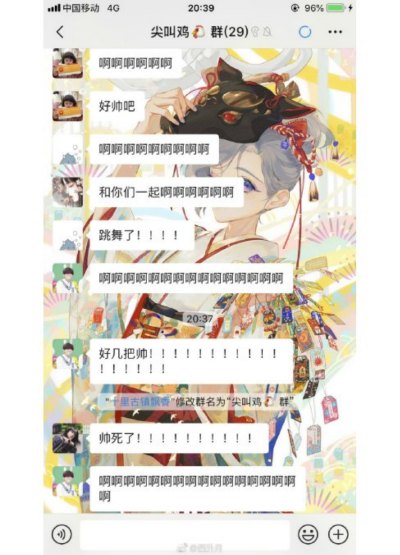


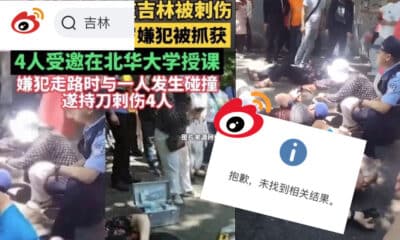


Henana
February 6, 2019 at 1:42 am
Thank you for breaking down the CCTV Spring Festival Gala! This was a great read, very helpful and appreciate the context!